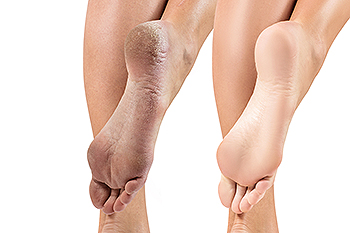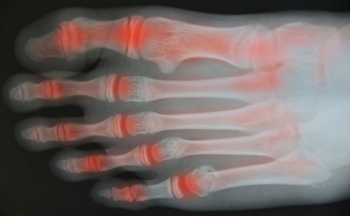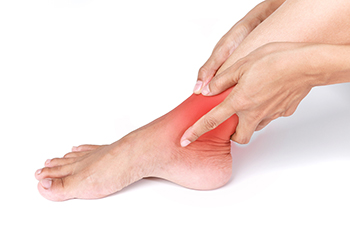Items filtered by date: April 2022
Unsightly Cracked Heels

Medical conditions that can include psoriasis and eczema may lead to unsightly cracked heels. It is an ailment that is caused by dry skin, and it can happen for a variety of reasons. The skin on the heels can become dry and cracked from wearing shoes that do not have a back, standing on hard surfaces for the majority of the day, or from living in a dry climate. It may be beneficial to drink plenty of fresh water daily, in addition to applying a good moisturizer on the feet before bed. In severe cases, cracks can cause pain and discomfort. Many patients find it helpful to wear shoes that are closed to protect the skin on the heels. If you suffer from this condition, it is suggested that you schedule an appointment with a podiatrist who can effectively treat this condition.
Cracked heels are unsightly and can cause further damage to your shoes and feet. If you have any concerns, contact Dr. Tupper from Coshocton Foot Health Center. Our doctor can provide the care you need to keep you pain-free and on your feet.
Cracked Heels
Cracked heels appear unappealing and can make it harder for you walk around in sandals. Aside from looking unpleasant, cracked heels can also tear stockings, socks, and wear out your shoes. There are several methods to help restore a cracked heel and prevent further damage.
How Do You Get Them?
Dry skin is the number one culprit in creating cracked heels. Many athletes, walkers, joggers, and even swimmers suffer from cracked heels. Age and skin oil production play a role to getting cracked heels as well.
Promote Healing
Over the counter medicines can help, especially for those that need instant relief or who suffer from chronic dry feet.
Wear Socks – Wearing socks with medicated creams helps lock in moisture.
Moisturizers – Applying both day and night will help alleviate dryness which causes cracking.
Pumice Stones – These exfoliate and remove dead skin, which allows for smoother moisturizer application and better absorption into the skin.
Change in Diet
Eating healthy with a well-balanced diet will give the skin a fresh and radiant look. Your body responds to the kinds of food you ingest. Omega-3 fatty acids and zinc supplements can also revitalize skin tissue.
Most importantly, seek professional help if unsure how to proceed in treating cracked heels. A podiatrist will help you with any questions or information needed.
If you have any questions, please feel free to contact our office located in Coshocton, OH . We offer the newest diagnostic and treatment technologies for all your foot care needs.
Tips for Healthy Running
 Many people take up running to get in shape or lose weight. Running is an easy form of exercise to do, because the only real equipment you need is a good pair of running shoes. Choosing the proper footwear is essential, making sure that you consider size, fit, cushioning, and support. A podiatrist can offer advice on the correct footwear to get you started. It is also a good idea to walk before you run, easing into it with 10- to 30-minute walks before including running. Experts suggest running twice a week at first and increasing time, distance and speed incrementally. To help avoid injury, warming up before you start increases blood flow to the muscles and helps prevent cramps and strains. Afterward, be sure to stretch and cool down. If you have any specific foot or ankle problems or previous injuries, it is suggested that you see a podiatrist for guidance on how to run safely.
Many people take up running to get in shape or lose weight. Running is an easy form of exercise to do, because the only real equipment you need is a good pair of running shoes. Choosing the proper footwear is essential, making sure that you consider size, fit, cushioning, and support. A podiatrist can offer advice on the correct footwear to get you started. It is also a good idea to walk before you run, easing into it with 10- to 30-minute walks before including running. Experts suggest running twice a week at first and increasing time, distance and speed incrementally. To help avoid injury, warming up before you start increases blood flow to the muscles and helps prevent cramps and strains. Afterward, be sure to stretch and cool down. If you have any specific foot or ankle problems or previous injuries, it is suggested that you see a podiatrist for guidance on how to run safely.
All runners should take extra precaution when trying to avoid injury. If you have any concerns about your feet, contact Dr. Tupper of Coshocton Foot Health Center. Our doctor will treat your foot and ankle needs.
How to Prevent Running Injuries
There are a lot of mistakes a runner can make prior to a workout that can induce injury. A lot of athletes tend to overstretch before running, instead of saving those workouts for a post-run routine. Deep lunges and hand-to-toe hamstring pulls should be performed after a workout instead of during a warmup. Another common mistake is jumping into an intense routine before your body is physically prepared for it. You should try to ease your way into long-distance running instead of forcing yourself to rush into it.
More Tips for Preventing Injury
- Incorporate Strength Training into Workouts - This will help improve the body’s overall athleticism
- Improve and Maintain Your Flexibility – Stretching everyday will help improve overall performance
- “Warm Up” Before Running and “Cool Down” Afterward – A warm up of 5-10 minutes helps get rid of lactic acid in the muscles and prevents delayed muscle soreness
- Cross-Training is Crucial
- Wear Proper Running Shoes
- Have a Formal Gait Analysis – Poor biomechanics can easily cause injury
If you have any questions, please feel free to contact our office located in Coshocton, OH . We offer the newest diagnostic and treatment technologies for all your foot care needs.
How to Deal With Arthritic Foot Pain
Arthritis, a painful inflammatory condition, can affect many parts of the body including the feet, particularly as you age. Arthritic foot pain often comes with stiff joints, as well as a loss of strength, flexibility, and mobility in the affected area. Various things can be done to relieve pain and slow the progression of this disease, including foot massages to improve circulation and decrease tension in the joint, using heat (to loosen the muscles and reduce stiffness), or using ice (to constrict blood vessels and reduce blood flow to the problem area). Wearing proper footwear (wide enough to accommodate orthotics or other foot aids and with proper arch support to stabilize the joints and feet) and continuing to move despite the pain may also help. Other suggestions include maintaining a healthy body weight, participating in physical therapy, using non-steroidal anti-inflammatory medications, topical creams, and;/or steroid injections. While there is no cure for arthritis, a podiatrist can help determine the best way to handle your arthritic foot pain.
Arthritis can be a difficult condition to live with. If you are seeking treatment, contact Dr. Tupper from Coshocton Foot Health Center. Our doctor can provide the care you need to keep you pain-free and on your feet.
Arthritic Foot Care
Arthritis is a term that is commonly used to describe joint pain. The condition itself can occur to anyone of any age, race, or gender, and there are over 100 types of it. Nevertheless, arthritis is more commonly found in women compared to men, and it is also more prevalent in those who are overweight. The causes of arthritis vary depending on which type of arthritis you have. Osteoarthritis for example, is often caused by injury, while rheumatoid arthritis is caused by a misdirected immune system.
Symptoms
- Swelling
- Pain
- Stiffness
- Decreased Range of Motion
Arthritic symptoms range in severity, and they may come and go. Some symptoms stay the same for several years but could potentially get worse with time. Severe cases of arthritis can prevent its sufferers from performing daily activities and make walking difficult.
Risk Factors
- Occupation – Occupations requiring repetitive knee movements have been linked to osteoarthritis
- Obesity – Excess weight can contribute to osteoarthritis development
- Infection – Microbial agents can infect the joints and trigger arthritis
- Joint Injuries – Damage to joints may lead to osteoarthritis
- Age – Risk increases with age
- Gender –Most types are more common in women
- Genetics – Arthritis can be hereditary
If you suspect your arthritis is affecting your feet, it is crucial that you see a podiatrist immediately. Your doctor will be able to address your specific case and help you decide which treatment method is best for you.
If you have any questions, please feel free to contact our office located in Coshocton, OH . We offer the newest diagnostic and treatment technologies for all your foot care needs.
Arthritis May Be Causing Your Ankle Pain
If your ankles are painful, stiff, or swollen, there is a chance that it may be related to one of several types of arthritis. Dysfunction in the body’s immune system causes it to attack healthy tissues, including joints like the ankle. These types of arthritis include rheumatoid arthritis (RA), lupus, and even juvenile arthritis, also known as a pediatric rheumatic disease. Gout is a form of arthritis that typically affects the big toe joint; however, it can also occur in the ankle joint. Gout is caused when an excessive amount of uric acid in the body forms sharp crystals that can lodge themselves into joint tissue causing severe pain and inflammation. Osteoarthritis (OA), the most common type of arthritis, occurs when joint cartilage deteriorates and causes underlying bones (such as those in the ankles) to rub against each other. Certain infections can cause an inflammatory response in joints including the ankle. This condition is known as reactive arthritis. Someone with psoriasis of the skin may also develop psoriatic arthritis in their ankles. If you are experiencing any type of pain in your ankles, contact a podiatrist to have your condition properly diagnosed and treated.
Plantar warts can be very uncomfortable. If you need your feet checked, contact Dr. Tupper from Coshocton Foot Health Center. Our doctor will assist you with all of your foot and ankle needs.
About Plantar Warts
Plantar warts are the result of HPV, or human papillomavirus, getting into open wounds on the feet. They are mostly found on the heels or balls of the feet.
While plantar warts are generally harmless, those experiencing excessive pain or those suffering from diabetes or a compromised immune system require immediate medical care. Plantar warts are easily diagnosed, usually through scraping off a bit of rough skin or by getting a biopsy.
Symptoms
- Lesions on the bottom of your feet, usually rough and grainy
- Hard or thick callused spots
- Wart seeds, which are small clotted blood vessels that look like little black spots
- Pain, discomfort, or tenderness of your feet when walking or standing
Treatment
- Freezing
- Electric tool removal
- Laser Treatment
- Topical Creams (prescription only)
- Over-the-counter medications
To help prevent developing plantar warts, avoid walking barefoot over abrasive surfaces that can cause cuts or wounds for HPV to get into. Avoiding direct contact with other warts, as well as not picking or rubbing existing warts, can help prevent the further spread of plantar warts. However, if you think you have developed plantar warts, speak to your podiatrist. He or she can diagnose the warts on your feet and recommend the appropriate treatment options.
If you have any questions please feel free to contact our office located in Coshocton, OH . We offer the newest diagnostic and treatment technologies for all your foot and ankle needs.




